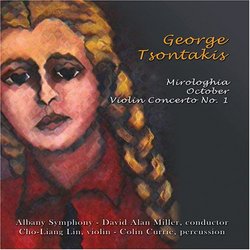| All Artists: George Tsontakis, David Alan Miller, Albany Symphony Orchestra, Colin Currie, Eleni Calenos, Cho-Liang Lin Title: George Tsontakis: Mirologhia; October; Violin Concerto No. 1 Members Wishing: 0 Total Copies: 0 Label: Koch Int'l Classics Original Release Date: 1/1/2008 Re-Release Date: 10/28/2008 Genres: Pop, Classical Styles: Vocal Pop, Forms & Genres, Concertos, Symphonies Number of Discs: 1 SwapaCD Credits: 1 UPC: 099923768029 |
Search - George Tsontakis, David Alan Miller, Albany Symphony Orchestra :: George Tsontakis: Mirologhia; October; Violin Concerto No. 1
 | George Tsontakis, David Alan Miller, Albany Symphony Orchestra George Tsontakis: Mirologhia; October; Violin Concerto No. 1 Genres: Pop, Classical
|
Larger Image |
CD DetailsSimilar CDs |
CD ReviewsSuperbly expressive orchestral music C. P. Cooman | Cambridge, MA USA | 11/25/2008 (5 out of 5 stars) "This superb release contains three large orchestral works by George Tsontakis (b. 1951), one of America's very finest composers. Though deeply connected to the music of the past, Tsontakis's music abounds with an invigorating freshness that compels active listening. "Mirologhia" is a concertante work for percussion and orchestra inspired by traditional Greek mournful singing. It evokes a spiritual journey through its six quasi-programmatic movements in which the orchestra and soloist contribute vocally as well as instrumentally to the lament discourse. Inspired by the autumns in the Hudson Valley Region of New York State (where the composer lives), "October" is a beautifully bittersweet work filled with evocative orchestral colors and grippingly memorable ideas. The 1st violin concerto is also quasi-programmatic, putting the soloist in direct opposition to the orchestra. In the liner notes, the composer writes: "I wanted a kind of introspective anti-hero, almost forced into delivering a message not larger, but quieter than life -- at least in terms of the quality of life existing around him." Beautifully performed by the excellent Albany Symphony under David Alan Miller (who has championed Tsontakis's music), this CD is one of the best releases of American orchestral music this year. Not to be missed." Three Works for Large Orchestra by One of America's Finest C J Scott Morrison | Middlebury VT, USA | 02/14/2009 (5 out of 5 stars) "Writing about music is daunting, particularly when one is trying to describe new music. How in the world does one convey how an unfamiliar piece sounds? It just isn't good enough to say 'this part sounds like Ravel' or 'that part sounds like Messiaen', particularly when such likenesses are only approximate at best. However, that said, I believe I could identify as by him any new piece of George Tsontakis's at fifty paces even if I couldn't put into words how I did it. His sound world is utterly unique to him. And it is utterly beautiful. As I said in an earlier review it is best with Tsontakis's music to sit back and let the music simply wash over you, without your trying to figure out form or construction. Tsontakis has complete command of his materials, is one of the most creative orchestrators currently composing, and has an unfailingly engaging gestural vocabulary. His music repays much repeated listening because he has such a fertile imagination that one hears unexpected new things each time. 'Mirologhia' is a concertante work -- it can't quite be called a concerto, and indeed Tsontakis does not call it that -- for percussion and large orchestra. Colin Currie, the brilliant British percussionist, is the soloist. The subtext of the piece is a woman's lamentation for her dead husband, killed in battle. Both the soloist and the orchestra members are occasionally called upon to sing or chant texts on that subject. The work is in six sections, two of which are short interludes. In the final section a soprano soloist (Eleni Calenos) pours out her grief. The work, like others of Tsontakis's works, e.g., his 'Man of Sorrows' George Tsontakis: Man of Sorrows; Berg Sonata; Webern: Piano Variations or Second Violin Concerto, makes much use of crystalline and delicate sounds from both percussion and the rest of the orchestra, one of Tsontakis's aural fingerprints. The performance by David Alan Miller and the Albany Symphony, and by the soloists, is above criticism. 'October' is a two-section tone poem about the coming of fall in Tsontakis's adopted home of upstate New York, in the Catskills. I is about the ending of summer, II about the approach of winter. Again, we are aware of Tsontakis's fecund imagination in such things as his use of a siren -- what does that represent? I don't know, but it triggers the listener's own imagination -- or in the second section a melody that sounds for all the world like a slight distortion of 'Twinkle, Twinkle Little Star.' (Musical quotation and distillation is another of Tsontakis's fingerprints.) And then there are those Tchaikovskian chord progressions. Well, I for one, have always thought Tchaikovsky was an 'autumn composer'. Finally, there is gorgeous use of quiet. Tsontakis says 'All my orchestration is based on soft music and how to blend it. It's quietness that really enters the heart.' 'October' is not only striking, it is profound. Tsontakis's Second Violin Concerto was recorded previously to great acclaim. George Tsontakis: Violin Concerto No. 2; Clair de Lune; The Past, The Passion Now we get his First Violin Concerto with the marvelous Jimmy Lin as soloist. Like his other concertos, this is not a typical concerto with heroic soloist set against the orchestra with obviously virtuosic ruffles and flourishes. Rather, it is a three-movement tone poem with the violinist as bystander, commentator, muser. Indeed, Tsontakis says "the soloist is an introspective 'anti-hero' ... delivering a message not larger, but *quieter* than life." In contrast to the sensitive comments of the soloist, in the first movement orchestral quotations appear: a silly (and repeated) citation of 'Hurray for Hollywood' makes a purposely vulgar appearance as does the theme song from 'I Love Lucy.' The last part of the first movement is marked 'Obnoxious'. The middle movement is dreamlike and lyrical with orchestra and soloist eventually reaching a fragile concord. The finale, at nine minutes the longest of the three movements, is a nervous moto perpetuo which is restless, edgy, exhortatory. The orchestral 'horn is the first member of the orchestra to grasp the soloist's message' and the cadenza is, surprisingly but fittingly, a duet between violinist and horn. 'The quiet anti-hero is willing to share his cadenza', the composer says. Violin and horn finally get the message across to the orchestra at large that cooperation is better than battle and the work ends with a vigorous peroration. Once again Tsontakis has triumphed with the great and good help of David Alan Miller, the Albany Symphony, and soloists Cho-Liang Lin, Colin Currie and Eleni Calenos. Scott Morrison " Tsontakis CD is a winner DL | 12/30/2008 (5 out of 5 stars) "I am really very impressed both with the music and the recording. This CD has a selection of some of Tsontakis's orchestral works from the past decade, including "October" (written for the Baltimore Symphony), Mirologhia (written for Glennie) and the first Violin Concerto.
Tstontakis writes terrific music, which for me lies in the perfect place of sophistication without being too cerebral and abstract. He is clearly one of the most important and interesting composers in the US today, and he has been increasingly played in Europe, as well. His music ranges from deeply spiritual to wildly irreverent, and I would recommend picking up this CD to anyone who is interested in contemporary classical music (or really any kind of music!) The recording with Miller and Albany sounds great--it is warm and intimate but retains its orchestral colors, which is needed, since Tsontakis is such a fine and sensitive orchestrator. It's an oasis in a time of darkness for classical recording, and I will listen again and again." |

 Track Listings (11) - Disc #1
Track Listings (11) - Disc #1
